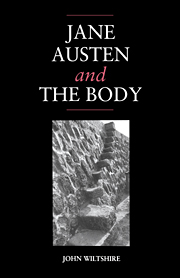Book contents
- Frontmatter
- Contents
- Acknowledgements
- A note on texts
- Introduction: Jane Austen and the body
- 1 Sense, sensibility and the proofs of affection
- 2 ‘Eloquent blood’: the coming out of Fanny Price
- 3 Emma: the picture of health
- 4 Persuasion: the pathology of everyday life
- 5 Sanditon: the enjoyments of invalidism
- Notes
- Bibliography
- Index
1 - Sense, sensibility and the proofs of affection
Published online by Cambridge University Press: 11 November 2009
- Frontmatter
- Contents
- Acknowledgements
- A note on texts
- Introduction: Jane Austen and the body
- 1 Sense, sensibility and the proofs of affection
- 2 ‘Eloquent blood’: the coming out of Fanny Price
- 3 Emma: the picture of health
- 4 Persuasion: the pathology of everyday life
- 5 Sanditon: the enjoyments of invalidism
- Notes
- Bibliography
- Index
Summary
‘Can he be a sensible man, sir?’ Elizabeth Bennet asks her father after hearing him read aloud Mr Collins' letter. ‘No, my dear, I think not,’ he replies, ‘I have great hopes of finding him quite the reverse’ (PP 64). So it turns out: ‘Mr Collins was not a sensible man’ declares the narrator roundly herself (70), but other men, in other books, on their first appearance, are quickly endowed with this salient virtue. Mr Knightley is introduced with this commendation as ‘a sensible man of about seven or eight-and-thirty …’(E 9), and though Henry Crawford has ‘sense and temper’ (MP 45), it is intimated, these will scarcely inhibit his future flirtations. Even Edward Ferrars, in a novel called Sense and Sensibility, certainly not handsome, and diffident in manner, is generously praised by Marianne Dashwood for the same quality. ‘I have the highest opinion in the world of his goodness and sense’, she declares, and Elinor in her own style reiterates ‘Of his sense and his goodness … no one can, I think, be in doubt, who has seen him often enough to engage him in unreserved conversation’ (20). ‘Sense’, ‘strong, manly good sense’, tends in the novels of Jane Austen and her contemporaries to be a masculine attribute, and its association in this novel pre-eminently with one of the heroines is a clue to its organisation. Actually, though, on the sisters' first introduction, sense itself is attributed to Marianne Dashwood (‘she was sensible and clever’ (6)) and this is one of the many indications that one is not to take the two heroines as merely antitheses.
- Type
- Chapter
- Information
- Jane Austen and the Body'The Picture of Health', pp. 24 - 61Publisher: Cambridge University PressPrint publication year: 1992



